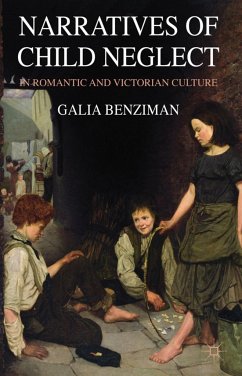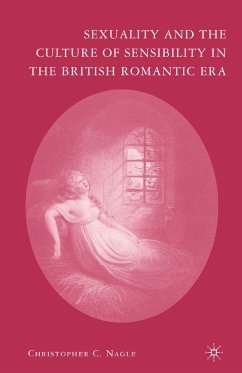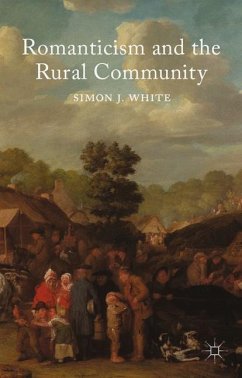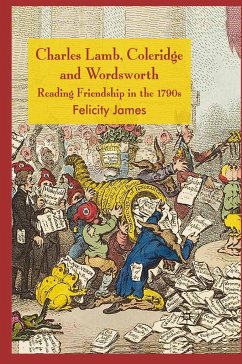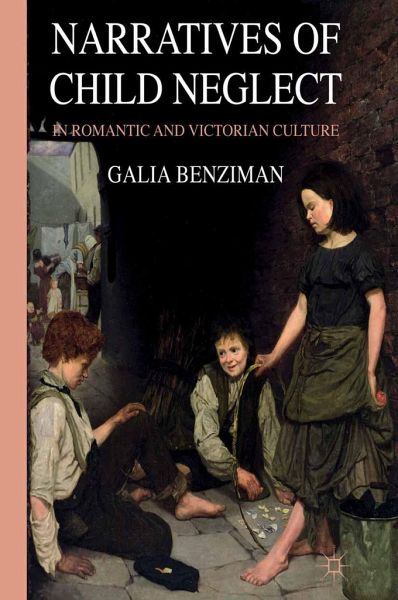
Galia Benziman
Broschiertes Buch
Narratives of Child Neglect in Romantic and Victorian Culture
Versandkostenfrei!
Versandfertig in 6-10 Tagen
Weitere Ausgaben:

PAYBACK Punkte
19 °P sammeln!





Contextualizing the topos of the neglected child within a variety of discourses, this book challenges the assumption that the early nineteenth century witnessed a clear transition from a Puritan to a liberating approach to children and demonstrates that oppressive assumptions survive in major texts considered part of the Romantic cult of childhood.
GALIA BENZIMAN is Lecturer in Comparative Literature at the Open University of Israel and specializes in British Literature of the Long Nineteenth Century. Formerly a Fulbright and Dan David Post-doctoral Fellow at the University of California Dickens Project, USA, she has published essays in JNT, Women's Studies, Partial Answers, Dickens Quarterly, The Victorian Newsletter, SEL (forthcoming), and other journals.
Produktdetails
- Verlag: Macmillan Education / Palgrave Macmillan UK / Springer Palgrave Macmillan
- Artikelnr. des Verlages: 978-1-349-33313-4
- 1st ed. 2012
- Seitenzahl: 256
- Erscheinungstermin: 1. Januar 2012
- Englisch
- Abmessung: 229mm x 152mm x 14mm
- Gewicht: 391g
- ISBN-13: 9781349333134
- ISBN-10: 1349333131
- Artikelnr.: 45074627
Herstellerkennzeichnung
Libri GmbH
Europaallee 1
36244 Bad Hersfeld
gpsr@libri.de
'A thoughtful work on a subject that is as urgent now as it was more than a century ago. Benziman's new conceptualization of ambivalences in educational practices and of neglect of child rights yields unexpected and at times iconoclastic insights into much studied texts.' - Professor Leona Toker, The Hebrew University of Jerusalem, Israel 'Narratives of Child Neglect in Romantic and Victorian Culture is a major intervention in the history of childhood and its representations in nineteenth-century English literature. Benziman offers a fresh, compelling analysis of familiar concepts, skillfully demonstrating the persistence of older Puritan and regulative attitudes toward the literary child within texts by Blake, Wordsworth, Dickens, and
Mehr anzeigen
others that have long been identified unambiguously with the emerging reformist and liberatory treatment of childhood during the Romantic and Victorian periods. Rigorously argued and closely attentive to historical and intellectual contexts, including social class, Benziman's study opens challenging new perspectives on the topos of the neglected child and the portrayal of child subjectivity in poetry and fiction.' - Professor John Jordan, Department of Literature, University of California, Santa Cruz, USA 'Addressing the interconnectedness of catechizing and liberating views of childhood from the Romantics to Thomas Hardy, Galia Benziman provides an important contribution to the history of child neglect in nineteenth-century England. Her attention to representations of the child voice in literary texts, combined with readings of canonical and lesser-known philosophers and writers, makes this study essential reading in the field of child studies.' - Monica Flegel, Associate Professor, Department of English, Lakehead University, Canada
Schließen
Für dieses Produkt wurde noch keine Bewertung abgegeben. Wir würden uns sehr freuen, wenn du die erste Bewertung schreibst!
Eine Bewertung schreiben
Eine Bewertung schreiben
Andere Kunden interessierten sich für


